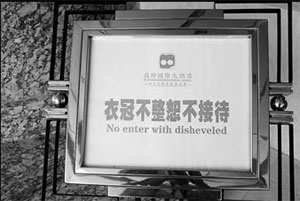Smash Chinglish - now
Recently my wife and I dined with friends at a neighborhood restaurant, an establishment with marvelous food and a long history: their chefs helped to prepare New China's first State banquet.
The English menu left something to be desired, however. The 16-page menu, in full color, listed such entrees as "Four happy kaofus", "Does the silk very hot", and "The ovary and digestive gland of a crab digs up the cabbage".
The restaurant's owners confided that during the Olympics, a group of foreigners came in, read the menu, laughed, and left. "Is there a problem?" the owners wanted to know.
There is. As China takes its rightful place in the world community, the language barrier persists.
Errant English translations have long been a source of amusement to foreigners in China. This is both condescending and a bit unfair; after all, how good is the foreigners' Chinese?

Beijing and the other venues did a commendable job of confronting the language barrier during the Olympics. Virtually every sign, map, - and most menus - were translated into serviceable English.
Legions of volunteers were trained to answer questions and give directions in English. Although taxi drivers did not learn as much English as planned, every meter now says brightly, "Welcome to take Beijing taxi!"
Away from the major cities, however, English remains an endangered species. We recently returned from a visit to Yiyang, in Hunan province, where we stayed in an elegant new five-star hotel. I was glad I was properly dressed, because a sign at the door read "No enter with disheveled."
Yiyang is my wife's father's hometown; we've been visiting there for decades. The city is making an impressive effort to modernize, without sacrificing its natural environment. Each time we visit, there is a new sports complex, a new industrial park, a new museum under construction. In case the message is not clear, it is spelled out on a billboard 50 m long outside the new hotel: "Try Hard to Catch up and Overrun the Advanced City Build Ecological Yiyang".
Many Chinese don't realize how pernicious poor English is. The best reporting, the most thoughtful analysis, the finest proposal, the most appetizing menu all are undermined by our common foe, Chinglish.
The long-term solution is obvious. A generation or two from now, there will be more Chinese who learned English as children, and more foreigners fracturing putonghua as well.
But must we wait? When China was awarded the 2008 Olympics and decided to go for the gold, it did not wait for a new generation of swimmers and fencers and baseball players to come of age. It got help quickly, from foreign coaches. The US did the same, and has gold medals in gymnastics and volleyball to show for it.
It is time for a similar offensive on Chinglish. If that means hiring more foreigners, so be it. This publication, among others, has shown that Chinese and foreigners can work together to produce good English, or any other language, and learn from each other in the process.
Often, the solution is already at hand. Somewhere in Hunan, there's an English teacher who could have improved that billboard in no time at all. When I mentioned that the sign outside the hotel was not quite right, it vanished. I'm betting it has already been replaced with one that reads "Proper dress required".
As we used to say in the 1980s, "China has friends all over the world." There's no reason not to accept their help.
I must be going. I need to "polish" that menu before dinner. I'm looking forward to a really good meal.
The author was one of China Daily's original "experts" in 1981. He recently returned to help with its Olympic coverage
(China Daily 09/05/2008 page9)








